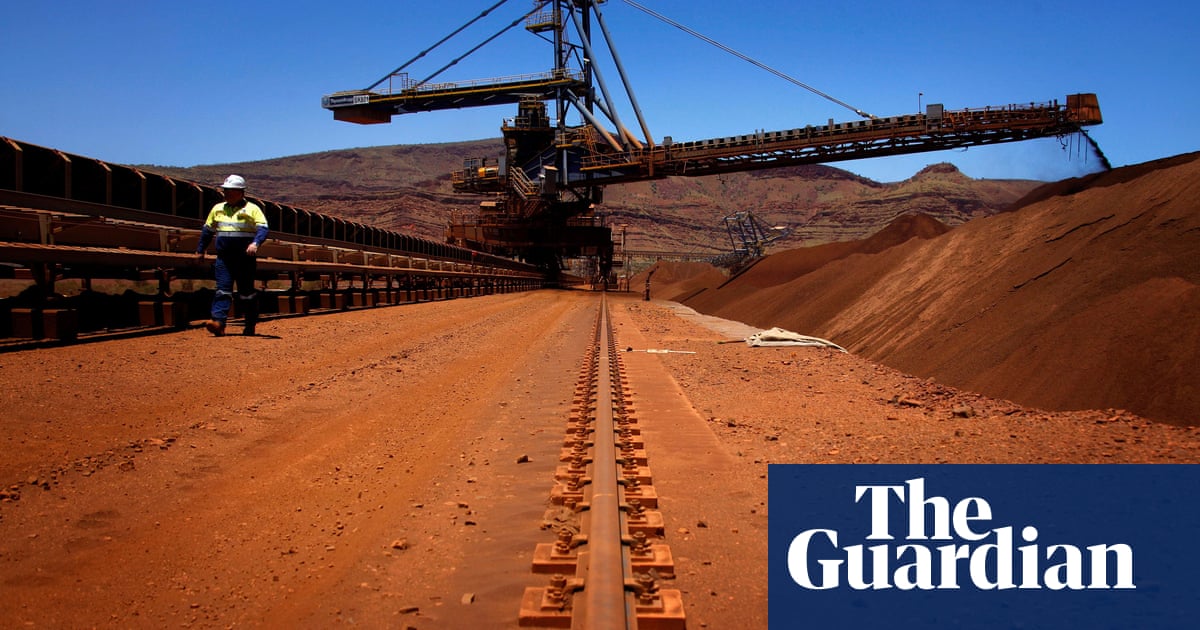Traditional owners in Western Australia are seeking more than $1bn in compensation for the Solomon Hub iron ore mine, but mining giant Fortescue Metals Group and the WA government say their claim is worth less than $10m.
The federal court justice Stephen Burley is hearing final submissions this week in the long-running legal dispute between the Western Australian government, Fortescue (FMG) and the Yindjibarndi people over the multibillion-dollar iron ore mine in the Pilbara region.
Yindjibarndi Ngurra Aboriginal Corporation is seeking a collective $1.8bn in compensation for economic, cultural, spiritual and social losses and harm since mining operations began almost a decade ago with state government approval, which it argues was given without its consent.
In its most recent budget, the WA government estimates it will garner more than $9bn in royalties from mining with about a quarter of that coming from iron ore.
It has been reported that the Solomon Hub iron ore mine has generated an estimated $80bn in revenue for Fortescue since 2013.
Yindjibarndi Ngurra Aboriginal Corporation alleged that Fortescue began mining in 2013 without any permissions or discussions with native title holders but with state government approvals under the then Barnett government.
Lawyers acting for the Yindjibarndi applicants told the court last week that complex relationships nurtured from birth until death, through marriages, funerals, lore and oral traditions, had been severely impacted through Fortescue’s mining operations.
“This has made very strong emotions and created much, effectively, bereavement in the community, because it was so, so important,” Tina Jowett SC, said, referring to a detailed anthropological report conducted by Kingsley Palmer on behalf of the claimants.
“Relationships that should have been there very strong and enforced through birth, death, marriage, men making ceremonies have collapsed since 2007.”
Fortescue argued in its submission filed last week that traditional owners are not entitled to compensation for any alleged discord, saying that disagreements and disputes arose from different views among Yindjibarndi and the mining company’s activities on the land.
“Part of that dispute was about whether (and on what terms) the YP should agree with FMG to land access. Because different YP [Yindjibarndi people] members within the YP had different views about whether an agreement should be made, it cannot be said that FMG caused the alleged disharmony.”
Fortescue claimed any acrimony within community was not within the purview of current legislation, with the mining company writing in court documents published last week: “Such ‘social division’ or ‘disharmony’ is not compensable under the [Native Title Act].
“A sum of no more than $8 million for the YP’s non-economic loss would reflect Australian standards that are appropriate, fair and just. Such a sum involves a very generous assessment.”
On Tuesday, Brahma Dharmananda SC, acting for Fortescue, argued that cultural and spiritual loss must be considered appropriately and in line with public sentiment in society.
“Value judgment, in our submission, should not be coloured by false questions about the preparedness of mining companies in other cases, to share a royalty percentage of their gains from minerals.
after newsletter promotion
“Our submission, properly focused on the impact of the attachment to the land and or connection to Country, cultural loss cannot include a claimed loss if it does not show an impact on the Native Title holders spiritual connection to the land.”
In its final submission to the federal court earlier this month, the WA government argued compensation for cultural losses under current legislation was not a “mathematic equation” but should be in line with community expectations with the compensation valued at between “$5-10 million”.
Compensation for economic loss of the land loss “amounts to $92,957.31,” it said.
The WA government, in its statement also argued that the arguments for compensation were “fundamentally flawed”, with compensation being sought under grounds that were not covered by native title legislation.
The Yindjibarndi Ngurra Aboriginal Corporation chair and lead applicant, Michael Woodley, told Guardian Australia that he believed the case was a landmark in that it had the power to reshape how mining’s cultural, social and economic impacts on First Nations people are understood.
Woodley said that mining companies could pay a far greater share of their profits to traditional owners if they were successful in their claim: “If resource developments are coming on to our land, then they’ll have to acknowledge that now the courts have established there is a certain percentage of royalties or resource benefit [to traditional owners].”
But he said that as outlined in court, the impact on the once pristine lands, waters and hundreds of important cultural sites had taken a psychological toll on him and the Yindjibarndi people: “The emotion of the land being picked up, blown up and exploited, impacted on … That’s a heavy burden for us to carry, both in a physical and a spiritual sense.”
The Yindjibarndi people were awarded exclusive native title rights to their land, including where Solomon Hub sits, in 2017.
The final submissions were continuing this week with a judgment expected later this year.
Article by:Source: Sarah Collard














